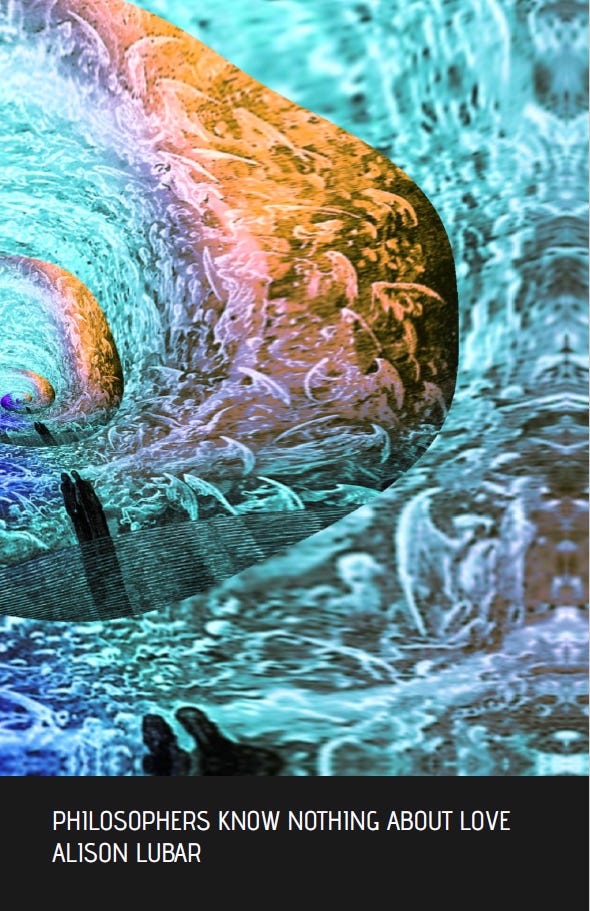I’m Only Human: A Review of Philosophers Know Nothing About Love by Alison Lubar
Part of the Afterimages NaPoMo series
When Alison Lubar is not writing, they are either teaching high school English or yoga. They have had work published in New York Quarterly, Apiary Magazine, and others. Lubar’s poem “You can’t say ‘Oriental,’” a runner-up in Philadelphia Stories’ 2022 Sandy Crimmins Prize, used the structure of a dictionary definition to explore a relationship between mother and child through the lens of race and culture. Part of being human is facing the challenge of balancing our sometimes conflicting intellectual, emotional, and physical needs. In their debut chapbook, Philosophers Know Nothing About Love, Alison Lubar presents this familiar challenge with a fresh perspective. Using allusions to classical texts, Lubar explores the sometimes-fraught relationship between the human urges to philosophize and to fall in love.
Lubar considers this blend of different parts of the human experience particularly clearly in the first poem, “A Prize For The Gladiator in the Midst of an Earthquake.” While a cataclysm occurs in the middle of a normal day, the speaker seems to castigate philosophy: “But really/ what does any philosopher/know about love?” (8-10). The speaker also compares oysters to the fate that awaits the loser in the Colosseum (11-15). This builds upon the philosopher Heraclitus, who the speaker refers to as having the concept that “you can’t ascend the same/staircase twice” (6-7). For the loser, dying is a moment that cannot be undone, just like a staircase ascended cannot be climbed twice. Lubar effectively builds on the reader's assumptions about philosophy seeming like a scholarly, rather than an emotional, pursuit. The human urge to philosophize, which seems to come from the rational part of the brain, is left out when discussing the human urge to love. Several other poems discuss this tension between the head and the heart: “Love Downhill,” “There Are 807 Miles Between the Ordinary And the Sublime,” “Wishing For A Fig In Winter,” and “Final Triptych.”
A rendezvous between the speaker and their lover is intermingled with allusions to various philosophical concepts in “Final Triptych.” The most notable among them is an allusion to Plato’s “Allegory of the Cave” and the myth of Orpheus and Eurydice: “If I was leading you out of the cave, I would turn around” (17). The poem recontextualizes classic mythology to show that some relationships, regardless of degree, transcend the boundaries society puts around them. Lubar relates classical, philosophical argumentation as represented by the allusion to Plato’s “Allegory of the Cave” to the heightened tragedy of Orpheus and Eurydice, connecting the emotional response to a rational scenario. In an uncertain author, it would become confusing to the reader, but in Lubar’s hands, these themes are expertly woven.
While familiarity with some of these references may augment and deepen a reader’s experience, Philosophers Know Nothing About Love is also a chapbook for those who may not know a lot about classical philosophy and mythology. Lubar’s references may enhance and emphasize the separation between the cerebral, emotional, and physical aspects of ourselves, but the struggle to find a balance is familiar to most of us. Although philosophy and love are complicated, sometimes conflicting topics, Alison Lubar tackles them with ease in this debut
Philosophers Know Nothing About Love
By Alison Lubar
Published by Thirty West Publishing House
45 Pages, 5.50 x 8.50 in.
April 2022 | $10.99
Ollie Shane (he/they) is the author of the chapbook, I Do It So It Feels Like Hell (Bottlecap Press, 2022). His work has been published or is forthcoming in Philadelphia Stories, New Voices Magazine, and elsewhere.







